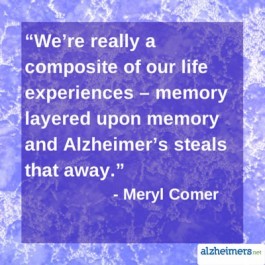Older Americans Month: Keeping Your Loved Ones with Alzheimer’s Disease and Dementia Safe

May is Older Americans Month, and this week we take a look at Alzheimer’s, a disease that affects more than five million older Americans, including 130,000 Arizonans. According to the Alzheimer’s Association, women age 65 and older are two times more likely than men to develop the disease. It is now the 5th leading cause of death in Arizona.
With a rise in the number of those who suffer from Alzheimer’s, more people are being placed in the role of caretaker. Caring for someone with Alzheimer’s can be exhausting, both mentally and physically. The labor of love can be more challenging due to incidents of wandering by those with Alzheimer’s or some other form of dementia.
The Department of Economic Security (DES) Division of Aging and Adult Services (DAAS) wants to provide you with the resources necessary to help keep your loved one safe. DES Adult Protective Services (APS) Program Manager, Joei O’Grady, says there are various strategies family members and caregivers can use to prevent wandering. O’Grady recommends the following:
- Maintain a routine to provide a source of structure
- Plan activities around the time when the individual is most likely to wander
- Use reassuring language if the individual feels lost, abandoned or disoriented
- Ensure all basic needs are met
- Place locks out of the line of sight
If those measures fail, O’Grady says, call family and friends to see if they’ve seen the missing person; check with local hospitals, then call the police. It’s helpful if you have an up-to-date photo. Tell police about specific behavioral tendencies or medical conditions. Once police take the report and have exhausted all other resources, they may activate the state’s Silver Alert System. Silver Alerts are issued for those 65 and older who are in imminent danger because of their health or other issues. Silver Alerts are issued via social media, local news outlets and highway message boards for further dissemination to the public.
“Once an alert has been issued, we [APS] cross-check the report with the Arizona Adult Protective Services System (AZAPSS) to see if there is an open case for the individual,” says O’Grady.
AZAPSS contains information related to cases of alleged senior neglect and/or abuse. If there is a match, the information is forwarded to authorities conducting the search.
The Tempe Police Department has gone a step further to help people find lost loved ones. They created a new program called Tempe Endangered and Missing Reunite. TEAM Reunite is for anyone in the city who may be inclined to wander due to dementia or cognitive impairment. Once someone is registered, the information is entered into a secure police data base which can be accessed by officers directly from their patrol vehicles. Having this access reduces the time between filing a report and the start of the search by authorities.
Registration is free and is open to Tempe residents, visitors, students or those who work in Tempe, regardless of age or medical condition. To ensure the information is current, the family caregiver will receive an alert on the registered individual’s birthday. This serves a reminder for them to update the individual’s file. However, the responsible party does not have to wait until the individual’s birthday to make necessary updates.
“Another great feature of this program is that officers can access the on-file information if they encounter an individual who may seem disoriented,” said Megan Hanks, Tempe Police Department Volunteer Coordinator. “In cases such as these, the family member may not realize the person is missing.”
Hanks, whose grandfather suffered from dementia and wandered, helped start the program in Tempe. She says leaders of other Arizona cities have expressed interest in adopting similar programs.
Members of the Arizona Alzheimer’s Task Force who worked on the Arizona Alzheimer’s State Plan identified five main goals to support those who suffer from dementia, and their caretakers. The goals include maximizing public awareness; developing new and enhancing existing supports for patients and families; expanding a dementia-capable workforce in Arizona; advancing and disseminating research and creating a dementia-capable system in our state.
Task Force member and Arizona State Representative, Heather Carter, who also chairs the House Committee on Health, believes the cure will be found in Arizona, due to the large number of internationally-renowned Alzheimer’s researchers working here, and what she calls a “robust” bank of brain donations in the state.
For more on living with Alzheimer’s and the latest on research, caregiving and other resources, visit the Alzheimer’s Association website.
Coming up next week: Keeping vulnerable adults safe from financial predators as we continue to celebrate Older Americans Month.
The 2017 Older Americans Month (OAM) theme is Age Out Loud, giving aging a new voice. This theme highlights many significant trends. Older Americans are now working longer, learning and trying new things, and engaging in their communities more. They’re taking charge and becoming more independent by advocating for themselves and each other. OAM 2017 is a perfect time to recognize and celebrate what aging is like today.
See Governor Ducey’s Older Americans Month proclamation.
By Vance Phillips

